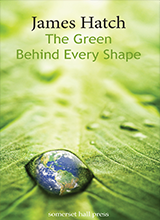James Hatch – The Green Behind Every Shape. Reviewed by Irene Koronas
(Irene Koronas is Poetry Editor for Wilderness House Literary Review.)
Hatch does not struggle with his process, but, he does write in flashes, his words congeal quickly, the verse scratches and chips away the surface of lives and objects; his subjects bend, twist and rise on cloudy vellum; a master of revision, these poems have an organic taste, they scent and swim before us with the faint touch of classical. “But no. he did, he does turn round, return, and shed, a gold solarity, again delivering to you his last, annealing kiss.” from the poem, “A place of thought,” Hatch sculpts on marble, like working on David.
“in the marketplace, doves freed from a brisk
magician’s sleeve or pocket flash in the hand.
at the level of shins and knees, gilded frames
for sale; students’ copies of old masters,
cleaned and stripped, reflecting in our faces
deities, stripped. You are addressed as maestro;
your careful boy walks after, cloaked and armed.
a preacher paces to the side, recounting hell,
and after re-enacted flames, some search
the ashes (fiery globules, squirming brass),
and the quick, burned fingers, like birds’ beaks, peck
for leavings: glass-plugs, hinges, gilt-melt, nails…”
The poet molds each poem, he casts it in its proper light, he positions the strophes in modern enjambments, his rooted entanglement with Leonardo, Brahms, and even Siamese twins; the fusion of biographical sketches, separate, together making the whole of each reason, each personal experience seen as the other, the other takes on the flesh of being ever present:
“Some listening to you might think the burden of your hands
blank ivory and ebony, the costly freight of desert caravans
and caravels that move in convoy off a palmy coast;
others, that your brawny, desperate, swimming arms
disparting heavy airs of hyacinth and spice
are fighting woolen waistcoat, collar, coat, and cuffs
to lay bare painful nakedness in spasms like a we-caught fly’s;
dim waxy gleams are the troubled dreams of one
who feels below his feet the cellar beat with furnace and
machine.
but I hear this: two young parents walk, still deep in love:
their children run in ever-changing patterns round them,
chasing swallows who have come to weave their own songs in
a summer field where the warm wind blows the tall grass up and down.”
Even in natural settings; a park bench, the reader is swayed by deep belief, a deep wisdom that blooms at the end of every branch, as in the tree’s presence, “in riverside park”; the poem stays in the garden, yet, travels the ‘ole’ neighborhood; with a longing for a difference, meaning, how hard acceptance can be. The poem is powerful in its changes, transitions, and metaphors; a chorus in parenthesis, “eyes frozen like a statue’s lidless stare…” chipping away, the poet opens, finds; “there are also leaves and branches, aren’t there? that’s how I noticed the relationship…” The writing is the tight tangle rooted out expressions of what it means to embrace tradition and then put into poetic form all that was and still is; this then invites the reader to sit, listen, and to partake from the bloom of poetry.

